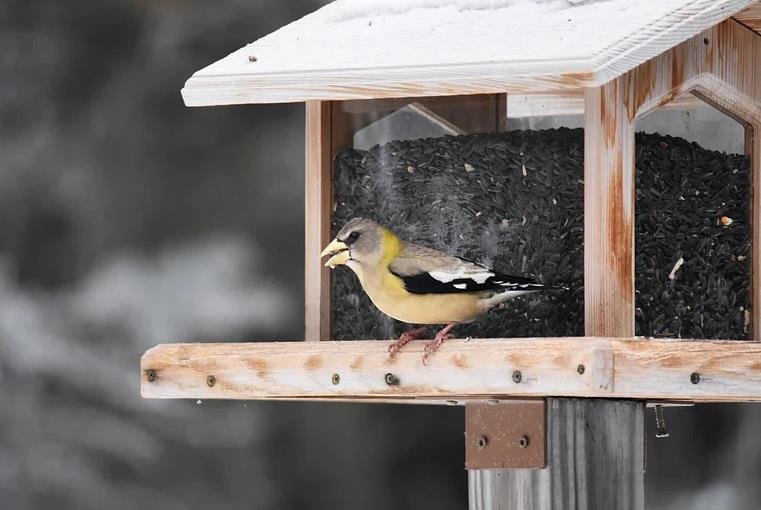As winter grips the UK, many birds choose to brave the freezing temperatures, ice, snow, and frost instead of migrating to warmer regions. These resilient creatures stay in Britain, facing dwindling food supplies and harsh weather conditions. Gardeners play a crucial role in helping these birds survive the long, cold months by providing a reliable source of nourishment.
The Importance of Regular Feeding in Winter
Feeding birds during winter is not just a kind gesture; it’s a lifeline. Birds need high-energy, high-fat foods to build fat stores essential for surviving when natural food sources are scarce.
Why Twice Daily Feeding?
The Royal Society for the Protection of Birds (RSPB) emphasizes the necessity of feeding birds twice a day during severe weather. Regular feeding times help birds know when to visit your garden, ensuring they don’t waste energy searching for food without success.
“In severe weather, you may find you need to feed twice daily. Birds need high-energy, high-fat foods during cold weather,” urges the RSPB.
Benefits of Consistent Feeding:
- Energy Boost: High-fat foods provide the necessary energy for birds to maintain body heat.
- Reduced Stress: Consistent food sources reduce the stress of foraging in harsh conditions.
- Healthier Flocks: Regular feeding supports overall bird health, aiding in disease prevention.

What to Feed: Choosing the Right Food for Winter
During winter, the dietary needs of birds change. Gardeners should switch from berries and seeds to fattier options to meet these requirements.
Recommended Winter Foods:
- Suet: A high-energy food made from animal fat, ideal for cold weather.
- Peanuts: Provide protein and healthy fats; ensure they are unsalted and unflavored.
- Nuts: Cracked or shelled nuts can be a nutritious option.
- Fat Balls: Commercially available fat balls are designed specifically for winter feeding.
Foods to Avoid:
- Salted or Flavored Foods: These can be harmful to birds.
- Bread: Offers little nutritional value and can cause health issues.
By offering the right types of food, gardeners can ensure that birds receive the nutrients they need to thrive during the winter months.
How to Implement a Twice Daily Feeding Routine
Establishing a consistent feeding schedule is key to effectively supporting birds in winter.
Practical Tips for Feeding Birds:
- Choose the Right Feeders: Use sturdy feeders that can withstand cold weather and keep food dry.
- Strategic Placement: Place feeders in sheltered areas to protect birds from harsh winds and predators.
- Monitor and Refill: Check feeders regularly, especially during extreme weather, to ensure a steady supply of food.
- Clean Feeders: Maintain cleanliness to prevent the spread of diseases among bird populations.
DIY Bird Feeder Ideas:
- Citrus Peels: Natural repellents like orange peels can keep unwanted pests away while attracting birds.
- Bird Suet Cakes: Homemade suet cakes can be customized with different seeds and nuts for variety.
Implementing these strategies can help create a supportive environment for birds, making your garden a safe haven during the winter months.
Legal Considerations: Ensuring Humane Practices
While feeding birds is beneficial, it’s essential to adhere to legal guidelines to protect both birds and gardeners.
Key Legal Points:
- Animal Welfare Act 2006: Under this law, it’s illegal to harm cats or other animals with deterrents, ensuring that all bird feeding practices remain humane.
- Feeding Regulations: Ensure that the food provided is safe and does not attract pests or other unwanted wildlife.
Safe Feeding Practices:
- Avoid Toxic Foods: Stick to recommended bird foods to prevent accidental poisoning.
- Respect Property Boundaries: Ensure that feeding areas do not infringe on neighbors’ properties or lead to disputes.
By following these legal guidelines, gardeners can responsibly support bird populations without facing legal repercussions.
Success Stories: Gardeners Making a Difference
Many gardeners have already seen positive results from implementing regular feeding routines, helping birds survive the winter.
Emma’s Experience in Brighton:
“I was losing my favorite rose bushes to the neighbor’s cats. After sprinkling orange peels around my garden, the cats have completely stayed away. It’s been a game-changer for me,” shares Emma Thompson, a local gardener.
Mark’s Tale in Manchester:
Mark Davies found that placing lemon slices in key areas deterred cats from using his vegetable beds as their personal restroom. “The cats have stopped visiting my garden, and my plants are thriving,” he reports.
These stories highlight the effectiveness of simple, natural solutions in creating a bird-friendly garden environment.
Additional Strategies to Support Birds in Winter
While feeding is essential, combining it with other strategies can enhance the survival chances of birds during winter.
Complementary Methods:
- Provide Water: Ensure that birds have access to fresh water, which is crucial during freezing temperatures.
- Shelter: Offer birdhouses or brush piles where birds can find refuge from the cold.
- Plant Native Species: Native plants provide natural food sources and shelter for local bird species.
By integrating these methods, gardeners can create a holistic support system for birds, ensuring their well-being throughout the winter.
The Environmental Impact of Supporting Birds
Supporting birds in winter has broader environmental benefits, contributing to ecological balance and biodiversity.
Benefits Include:
- Pollination: Birds help in pollinating plants, which is vital for garden health.
- Pest Control: Many bird species feed on insects, reducing the need for chemical pesticides.
- Biodiversity: Encouraging a variety of bird species fosters a healthy and diverse ecosystem.
These environmental advantages make bird feeding not only a compassionate choice but also an ecologically beneficial one.
Final Thoughts: A Simple Act with Lasting Impact
Feeding birds twice a day in December is a straightforward yet impactful way to support wildlife during the challenging winter months. By choosing the right foods, maintaining a consistent feeding routine, and adhering to legal guidelines, gardeners can make a significant difference in the lives of birds.
As winter progresses, the collective effort of gardeners across the UK can lead to healthier bird populations and more vibrant, resilient gardens. So, grab those citrus peels and start feeding—your garden’s avian visitors will thank you.
















